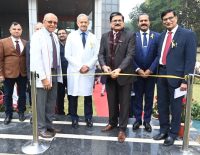60% of cancer patients below 40 years are male in India: Study

Twenty per cent of cancer patients who called an NGO-run helpline to seek a second opinion were below 40 years of age, indicating a rise of cancer incidences amongst younger people, data from the organisation stated. There were 1,368 callers between March 1 and May 15, according to the Cancer Mukt Bharat Foundation, launched by a group of oncologists.
The study showed that 60 per cent of the cancer patients below the age of 40 years were men. It also found that the most prevalent cases were head and neck cancer (26 per cent), closely followed by Gastrointestinal cancers (16 per cent), breast cancer (15 per cent) and then blood cancers (9 per cent).
The most number of calls were from Hyderabad, followed by Meerut, Mumbai and New Delhi, a statement by the NGO said. The helpline number (93-555-20202) was launched for the patients to seek second opinion free of cost. It is operational from 10 am to 5 pm from Monday to Saturday.
Cancer patients can call the helpline number to speak to leading oncologists directly or even do a video call to discuss their cancer treatment. Dr Ashish Gupta, Principal Investigator and senior oncologist who is heading the Cancer Mukt Bharat Campaign said that since the launch of the helpline number, it has proven to be a support system for cancer patients across India and almost hundreds of calls are received every day.
The study also found that 27 per cent of cases diagnosed in India are in stages 1 and 2 of cancer whereas 63 per cent are in stage 3 or 4 cancer. The most common question of the cancer patients was for a second opinion and to confirm whether their cancer treatment was correct and up to date. Some also check the availability of the latest treatment or medicine to treat their respective cancer as in cancer treatment as new medicines are approved almost every week, he said.
Dr Ashish Gupta further said, “In our country escalating rates of obesity, change in dietary habits, specifically the increase in consumption of ultra-processed food, and sedentary lifestyles also are associated with higher cancer rates. We must adopt a healthy lifestyle and avoid the use of tobacco and alcohol to prevent the risk of cancer in the younger generation”.







